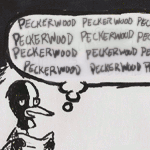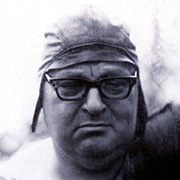|
OldTennisCourt posted:What was a normal dinner for a peasant in the Middle Ages? Pease porridge hot, pease porridge cold, pease porridge in a pot nine days old.
|
|
|
|

|
| # ? Apr 25, 2024 06:39 |
|
Ha I was just about to post that peasants ate the same poo poo from the Neolithic revolution up till recently the world over: some kind of grain mush. Keeps you going.
|
|
|
|
Mr. Wynand posted:So was it boradly equal measures of self-funded work and espionage that got the bomb out the door on the Soviet side, or could one point to one source of progress as the main contirbutor? That's still something of an open debate among Cold War historians, exactly how much each factor weighed into the building of the Soviet bomb. I mean they would have figured it out eventually, but got a leg up via the various espionage channels they had into western bomb project. quote:That tiny window of time between the US having the bomb and literally nobody else is pretty crazy to think about - it seems the US was somewhat caught be surprise with the soviet test while still in the process of figuring out just how much peen they really want to throw around and where, using their fancy new city-eradication weapons. The actual bipolar nuclear standoff we got is often read as being extraordinarily dangerous and unstable, but one can't help but think about how close we were to an exclusivley US-lead nuclear world-hegemony. One of the more interesting elements I think is the debates among western scientists and politicians about how much, if any, information about nuclear power/weapons they thought they should share with the Soviets, at least in the immediate aftermath of the war (obvious once you hit the 50s it's a moot point and relations had soured too much for it to matter even were it not). Oppenheimer and others initially thought that by sharing the info around, the Cold War and nuclear brinksmanship could have been avoided.
|
|
|
|
icantfindaname posted:I don't think the US could have prevented the USSR from getting the bomb, nor other major powers. It's not like the physics works differently in Russia, they could have figured it out eventually. Even if the US had a larger window in which they were the sole nuclear power I'm not sure what geopolitical effects it would have had. Maybe North Korea wouldn't exist because the threat of being nuked by China/USSR wouldn't exist. I don't think we would have used nukes in China to prevent Mao from winning there. Other than that I don't think things would have been too different They could have immediately gone to nuclear war with the USSR (or maybe first just try threatning to) in order to prevent them from developing a bomb + working delivery system. AFAIK this option was given a fair amount of thought post-WW2. The main reason it didn't happen is probably just the political unpalateability of starting a new world war having just concluded one. Even if the USSR could still succesfully develop a working bomb while having their remaining cities and industrial zones continously subjected to US nuclear attacks, ICBMs were still a long ways off from being developed, and in terms of dropping bombs using old fashioned "Enola Gay"-type bombers, they were probably too far behind the US to pose a credible threat to the continent. In that world either the US "wins" and becomes an unssailable global hegemony, or the USSR manages to fight back with their own nukes and everybody dies. Fun-fun. I'm not saying this was in any way remotely likely to actually happen, though had the roles been reversed between the USSR and USA I'd be less sure.
|
|
|
Arglebargle III posted:Pease porridge hot, Also, lots of beer.
|
|
|
|
icantfindaname posted:most gladiator fights didn't end in them being killed There's been discovered some funny inscriptions on gladiator graves. Like "gently caress the one who judged this fight" and "my advise is to kill your opponent when you have the chance".
|
|
|
|
|
I thought gladiators were an exclusively Roman thing, and all the surrounding civilisations were aghast at the idea of them?
|
|
|
|
Mr. Wynand posted:They could have immediately gone to nuclear war with the USSR (or maybe first just try threatning to) in order to prevent them from developing a bomb + working delivery system. AFAIK this option was given a fair amount of thought post-WW2. The main reason it didn't happen is probably just the political unpalateability of starting a new world war having just concluded one. Even if the USSR could still succesfully develop a working bomb while having their remaining cities and industrial zones continously subjected to US nuclear attacks, ICBMs were still a long ways off from being developed, and in terms of dropping bombs using old fashioned "Enola Gay"-type bombers, they were probably too far behind the US to pose a credible threat to the continent. In that world either the US "wins" and becomes an unssailable global hegemony, or the USSR manages to fight back with their own nukes and everybody dies. Fun-fun. I think the key issue is if the Soviets would have been able to get nukes together before the US figured out the H bomb. That said, the US devoted so many resources in the first place to fusion weapons because the Soviets had nukes. If anything it might have simply retarded development on both sides. If the US were still using first generation weapons, it is fairly doubtful they would have picked a fight with the Soviets. One thing is that bombers with propellers make for a relatively poor delivery system when your opponent can protect its airspace. Hell, even B-52s could still intercepted and I doubt Soviet fighter development would have changed very much. Also, the Red Army was massive during the 1940s and would have likely crushed NATO in a protracted fight, and I don't know how much the bombs would have titled the favor since they weren't designed for tactical use. Admittedly, a poo poo-ton of people would have died but if anything I think the US would have used nukes sparingly especially if they were worried about bombers being downed in Soviet controlled territory. The last thing the US would have wanted was the Soviets to get a free nuke on their hands (which would have ended the entire charade.) We were willing to use the bomb on Hiroshima and Nagasaki because they simply didn't have any ability to challenge their own airspace. It might have given the US a little more leverage in negotiations though and the Berlin blockade might not have happened.
|
|
|
|
Please don't start in on the reasons for using the nuclear bomb or your wacky alt-historical fantasies.
|
|
|
|
Teriyaki Hairpiece posted:Please don't start in on the reasons for using the nuclear bomb or your wacky alt-historical fantasies. donald trump is president, we're living in a wacky alt historical fantasy
|
|
|
vegetables posted:I thought gladiators were an exclusively Roman thing, and all the surrounding civilisations were aghast at the idea of them?
|
|
|
|
|
Shbobdb posted:Why are the people most oppressed by despotic governments the most likely to support the principles behind despotic governance? "If only Comrade Stalin knew what they were doing to us!"
|
|
|
|
vegetables posted:I thought gladiators were an exclusively Roman thing, and all the surrounding civilisations were aghast at the idea of them? While no one else took the idea as far as the Romans did, their gladiatorial games evolved out of earlier Greek and Etruscan traditions of ritual combats and funeral games.
|
|
|
|
How were the first forms of government organized?
|
|
|
|
Baloogan posted:How were the first forms of government organized? Poorly. Serious answer is that this turns on how you define government since for some definitions of government, the first government would have been tens of thousands of years before history.
|
|
|
|
How violent were the vikings relative to other contemporary invaders? They were definitely brutal but how much worse was it to experience a viking raid than, say, the Hungarian invasions that happened around the same time?
|
|
|
|
Bates posted:How violent were the vikings relative to other contemporary invaders? They were definitely brutal but how much worse was it to experience a viking raid than, say, the Hungarian invasions that happened around the same time? Pretty much on-par. It's important to remember our image of the Vikings comes primarily from English records. When a bunch of English fishermen loaded up their boats with weapons and raided another English fishing village hoping to steal some food and/or avenge the last raid, well, that's just what you do in lean times. When a set of Norse fishermen load up their boats with weapons and raid an English fishing village, they were incomprehensibly brutal monsters apparently just doing it for kicks.
|
|
|
|
Arglebargle III posted:Poorly. Yeah this question's too broad to answer effectively, really, and belongs more to archeology and anthropology than history. What we'd probably recognize as the earliest forms of government probably emerged out of extended family/clan structures way back in prehistory. Ze Pollack posted:Pretty much on-par. While there wasn't as much difference as Christian Europe claimed at the time, we shouldn't downplay the ferocity of the Vikings. Dudes' invented berserkers, after all.
|
|
|
Bates posted:How violent were the vikings relative to other contemporary invaders? They were definitely brutal but how much worse was it to experience a viking raid than, say, the Hungarian invasions that happened around the same time? If the vikings could avoid raiding they happily did it, that's why they introduced danegeld (dane tribute). The way it worked was that you paid the vikings a certain amount of silver and in return they didn't raid you. The only times the vikings would burn your country to the ground was if you had done something really stupid like killing a beloved leader (https://en.wikipedia.org/wiki/Great_Heathen_Army) or massacring the local danes living in your country (https://en.wikipedia.org/wiki/Sweyn_Forkbeard#Invasions_of_England).
|
|
|
|
|
Baloogan posted:How were the first forms of government organized? as quasi-theocracies: the first governments were probably formed when certain men: priests in the west and shamans in the east, convinced people around them that they had a special connection to the divine and therefore had the authority to hold power over them. The first palaces probably grew from temples where religious ceremonies were conducted.
|
|
|
Captain_Maclaine posted:While there wasn't as much difference as Christian Europe claimed at the time
|
|
|
|
|
Alhazred posted:Many of the vikings actually were christians. Olav the Holy is a saint, Harald Hardrade served in the varangian guard, Harald Bluetooth turned the danes to christianity, Cnut the Great made a pilgrimage to Rome and Olaf Tryggvason built the first church in Norway to name a few. Eventually, sure. I guess I should have specified the original waves of raiders.
|
|
|
|
Teriyaki Hairpiece posted:Ha I was just about to post that peasants ate the same poo poo from the Neolithic revolution up till recently the world over: some kind of grain mush. Keeps you going. Pottage also an option. Perpetually boiling cauldron of stew/soup that you keep adding water and edible stuff to. Take some out, eat it, add some more stuff to it, keep it hot and it doesn't go off. The Stew of Theseus essentially. I do not personally recommend pease pudding as it smells like the devil's ballsack. Tastes mostly just like peas though. OwlFancier fucked around with this message at 18:07 on Feb 1, 2017 |
|
|
|
Baloogan posted:How were the first forms of government organized? There seemed to be a few routes. Semi-democratic pragmatic councils of wealthy landowners, sometimes but not always with a king with limited powers, and vaguely theocratic autocracies arising from religious priesthoods seem to be the most common. One of the earliest depictions of a monarch we have in the Indus civilization is assumed to be a priest-king based on dress/pose.
|
|
|
|
Captain_Maclaine posted:Eventually, sure. I guess I should have specified the original waves of raiders. The original waves of raiders were mostly famed for hitting wealthy monasteries. It's easy to be fierce and devastating if your opponents are almost entirely wealthy but unarmed. As for the middle period where we start to see viking armies, the viking advantage lay not with their warriors but their organization. The Anglo-Saxon military consisted of a small gedriht of professional warriors that stayed with the local heptarchy king, and the fyrd, a force of conscripted farmer-solders that was basically a militia. The problem was that the vikings were much faster due to their longboats and mastery of the seas. The gedriht was skilled enough to beat an equal sized viking force, but the gedriht can only be in one place at a time. It was easy for viking warbands to avoid the gedriht unless they had a numerical advantage. The fyrd needed a numerical advantage to beat the vikings, but it takes time to gather warrior-farmers from many villages. So viking warbands could deal with the fyrd either by speed, hitting small groups of the fyrd before it could gather, or waiting for the warrior-farmers to scatter due to farming concerns. Wessex (the kingdom of the West Saxons) would later reform this systeme under Alfred the Great, and all the viking gains from the Great Heathen Army would be reversed. Now, that wasn't the end of the vikings in England. But the next great viking threat to England would come from Cnut the Great, the christian King of Denmark. EDIT: If you've ever read Beowulf, the guys in Hrothgar's feasting hall are Hrothgar gedriht. If Hrothgar need to form a 5000 man army, all the other people he'd have to call up from various villages would be the fyrd. As for nuclear strategy, during Eisenhower's presidency, the U-2 revealed that the "missile gap" between the US and USSR actually went the other way. The first spy satellites under JFK basically confirmed this. There were some surprisingly high-ranking officials who thought it was worth sacrificing Europe to smash the USSR with gen-1 ICBMs while the USSR didn't have the capability to hit the US. golden bubble fucked around with this message at 21:23 on Feb 1, 2017 |
|
|
|
OwlFancier posted:Pottage also an option. Perpetually boiling cauldron of stew/soup that you keep adding water and edible stuff to. Take some out, eat it, add some more stuff to it, keep it hot and it doesn't go off. I did sell stews short. I do love peasant stews that have become haute cuisine. For instance, I really want to try the northern Italian stew that includes a calf's head.
|
|
|
|
Bates posted:How violent were the vikings relative to other contemporary invaders? They were definitely brutal but how much worse was it to experience a viking raid than, say, the Hungarian invasions that happened around the same time? The Anglo-Saxon Chronicle says that Norman knights pillaging the countryside during the Anarchy were worse than any Viking raid. The Chronicle describes knights torturing peasants for any food and valuables they may have hidden. So that may have not been a common thing during the Viking incursions, which tended to be quick raids that may not have had time for that sort of grinding misery.
|
|
|
|
Arglebargle III posted:The Anglo-Saxon Chronicle says that Norman knights pillaging the countryside during the Anarchy were worse than any Viking raid. The Chronicle describes knights torturing peasants for any food and valuables they may have hidden. So that may have not been a common thing during the Viking incursions, which tended to be quick raids that may not have had time for that sort of grinding misery. To be fair, the Anglo-Saxon Chronicles was written during the reign of and probably received funding from Alfred the Great, killer of vikings, savior of Wessex.
|
|
|
|
The entry I'm referencing was written 250 years after Alfred's death so I don't think he had much influence on the author. From the Peterborough Chronicle AD 1137 entry: quote:Alle hī wǽren forsworen & here trēwžes forloren. For ǽfriċ rīċe man his castles macede & aġǽnes him hēlden. & fillden že land ful of castles. Hī swenċeden swīže že wreċċe men of že land mid castelwerces žā že castles wǽren maced žā fillden hī mid dēfles & ifle men. Žā nāmen hī žā men že hī wēnden žat āniġ gōd hafden, bāže be nihtes & be dęġes, carlmen & wimmen. & diden hem in prisun after gold & silfer. & pīneden hem - untellendliċe pīning. For ne wǽren nǽfre nān martirs swā pīned alse hī wǽren. Me hengede up bī že fēt & hī smoceden hem, mid fūl smoce. Me hengede bī že žūmbes, ožer bī že hǽfed, & hī hēngen brinġes on here fēt. Me dide cnotted strenges abūten here hǽfed, & wrižen tō žat it ġēde tō že harnes. Hī diden hem in cwarterne žǽr naddres & snaces & paddes wǽren inne, & drǽpen hem swā. Sume hī diden in crucethur - žat is in ān ċeste žat was sċort & narwe & undēp - & dide sċarpe stānes žǽrinne. & žrengde že man žǽrinne, žat him brǽcen alle že limes. In maniġ of že castles wǽren lōf & grīn, žat wǽren racentēġes žat twā ožer žrē men hadden ġenōh tō beren āne. Žat was swā maced, žat is - fastned tō ān bǽm. & diden ān sċarp īren abūten že mannes žrote & his hals, žat hē ne mihte nohwiderwardes, ne sitten ne liġen ne slēpen, ac beren al žat īren. Maniġ žūsend hī drǽpen mid hunger. Ī ne can ne ī ne męġ tellen alle že wunder ne alle že pīnes žat hī diden tō wreċċe men on žis land. & žat lastede žā xix wintre hwīle Stephne was cing & ǽfre it was werse & werse. Hī leġden ġēldes on že tūnes ǽfre umb hwīle & clepeden it tenserie. Žā že wreċċe men ne hadden nān māre tō ġefen. Žā rǽfeden hī & brennden alle že tūnes, žat wel žū mihtest faren al a dęġes fare sċuldest žū nǽfre fīnden man in tūne sittende, ne land tiled. Žā was corn dēre & flǽsċ & ċēse & butre, for nān ne was on že land. Wreċċe men sturfen of hunger. Sume ġēden on almesse že wǽren sum hwīle rīċe men. Sume flugen ūt of lande. Was nǽfre ġēt māre wreċċehād on land. Ne nǽfre hǽžen men werse ne diden žan hī diden. For ofer siden ne forbǽren hī nowžer ċirċe ne ċirċeġard, ac nāmen al že gōd žat žǽrinne was. & brennden sižen že ċirċe & al tōgadre. Ne hī ne forbǽren bisċopes land ne abbotes ne prēstes, ac rǽfeden muneces & clerces, & ǽfriċ man ōžer že hī ofermihten. Ġif twā men ožer žrē cōmen rīdende tō ān tūn, al že tūnsċipe flugen for hem; wēnden žat hī wǽren rǽfres. Že bisċopes & lǽred men hem curseden ǽfre, ac was hem nāht žǽrof , for hī wǽren alle forcursed & forsworen & forloren. Hwǽr swā me tilede, že erže ne bar nān corn, for že land was al fordōn mid swilċe dēdes. & hī sęġden openlīċe žat Crīst slēp, & his halgen. Swilċ & māre žan wē cunnen sęġen. Wē žoleden xix wintre for ūre sinnes. quote:They were all forsworn, and forgetful of their I can't find a reading for this entry but you can hear how the text would sound http://www.arts.gla.ac.uk/stella/readings/Middle/peterboro.htm in this reading of the 1135 entry. Arglebargle III fucked around with this message at 22:33 on Feb 1, 2017 |
|
|
|
Any good links/books/resources about Italian political history from between after WW2 and modern times? Il Divo was a really cool movie but I missed a great deal not knowing that history.
|
|
|
|
What are some good books about literally any African history outside of Ancient Egypt? I am shamefully ignorant of it.
|
|
|
vegetables posted:What are some good books about literally any African history outside of Ancient Egypt? I am shamefully ignorant of it.
|
|
|
|
|
Baloogan posted:How were the first forms of government organized? You also likely have some primitive communist or at least more communal organization. In Phoenix from about AD 750-1050 you have the Hohokam massively expanding canal irrigation with some giant canals, building big ballcourts and having a regional trade network, but we can't really find good evidence for a single or even a group of elites who ran it all. You find some slightly richer burials and slightly bigger pithouses, but they're spread throughout a village and not clustered all in one place, add to that the general trend of only finding really fancy stuff in burials, which were cremated and also not marked, and the general trend towards finding rich burials and even slightly bigger pithouses throughout a canal system and in multiple villages along said system and it's hard to make a case for managerial elites. It's more likely that what was going on was a sort of consensus based system with multiple layers of authority, some of them ascribed by birth, as evidenced by a few sub-adult burials with rich grave goods in that time period, but also a lot of offices that seem earned, in line with historic O'odham society. So the lowest layer is probably the family, nuclear or extended, represented by a group of pithouses, usually 2-12, called a courtyard group. That probably operated with older adults managing work, basically like any family unit, and would have been responsible for family fields and upkeep of the distribution canals and turnouts leading to your plot. Beyond that was probably the cluster of courtyard groups, basically a neighborhood, smaller than a village, that probably maintained the segment of branch canal, the next step on the canal system, that they were closest to, or that was nearest their plots. Authority there was probably vested in family heads or chosen representatives who met the other family representatives to make decisions involving the branch canal and water allocation. Next was the village, which was usually focused linearly along a branch canal. We don't really have evidence of a single chief in terms of houses or wealth, so it's likely that decision making was again spread throughout, and the rich burials that seem to be common in most courtyard groups and neighborhoods likely represent village level representatives drawn from throughout the settlement. Finally you have the whole main canal system, which depending on the size contained anywhere from 2-4 to as many as 10 villages. There are some larger structures located near the plazas of some of the larger villages that seem to be meeting spaces, supplanted and supplemented by the ballcourts a little later. That was probably where representatives drawn from the various villages met to arrange maintenance of the canal and distribution of water and water rights. Basically the archaeological evidence suggests that "elites" such as they existed were spread throughout villages, and a lot of families seem to have had at least one at some point, suggesting a system of governance based on representation of family, neighborhood, village and canal system interests. Whether this was elected or based on skill we can never really know for certain, but it certainly seems consensus based. Most interesting is the period from AD 1000-1050, where basically specialists in ceramics arise, with certain villages specializing in certain ceramic forms or in decorated ceramics and then distributing them, most likely through markets associated with ritual ballgames at the ballcourts, throughout the an area that extends from the Verde Valley on the north, to the Gila River on the south and from Gila Bend on the west to modern Lake Roosevelt on the east, with another system in Tucson. What's most striking is despite the high degree of organization involved, and the archaeologically visible hand of individual artisans, the distribution doesn't seem to have been controlled by elites, rather it was the artisans, farmers and hunters basically specializing in what their geographic region was best suited for and complimenting each other. Of course that fell apart when some ecological problems including floods and droughts, started to hit. But yeah, real complex society, seemingly complex governmental system, no real evidence for priest-chiefs or high chiefs.
|
|
|
|
Baloogan posted:How were the first forms of government organized? Depends on what you mean by "government". If you're talking about the emergence of cities as political units, then I think I'm correct in saying that the earliest cities (in the ancient Near East / Mesopotamia) didn't really evince signs of any clear, formal hierarchies. The earliest cities tended to have fairly uniform layouts, without any large or prominent buildings, which would seem to indicate that no one person or family had a prominent status. These early cities were typically small (a few hundred people at most) and we can presume that they were only able to produce at subsistence level, which tells us that they probably had no need or capacity for a ruling class. (Kings and their retinue don't produce anything, so are only viable where they're able to marshal a labour force to produce on their behalf.) If you're talking about the emergence of leadership and social hierarchy, then one plausible hypothesis is that of the "Big Man". Basically, people can be drawn to unite under a particularly charismatic leader, particularly for reasons of collective defence or expansion. Such a political unit would only last as long as the leader himself, though, and may not persist after his death. Hereditary leadership would be the next step, of course, but this would still be dependent on the perceived ability of the leader to protect or expand the territory of the group, which would require the maintenance of an army. Every man standing on a battlefield holding a sword is a man who is not tilling the land, which means that such forms of leadership are only possible in polities that are sufficiently large and complex enough to produce at a comfortable surplus. Preserving the unity of this group would also probably require a unifying ideology of some sort (in the form of religion, ethnicity etc.). If you're talking about government as a centralised, professional class of kings, courts, scribes, priests and so on, then these are the hallmarks of an complex social organisation, which requires - among other things - the capacity to produce at a surplus, the military might and legitimacy to confiscate this surplus, and a complex division of labour. Even then, such forms of political centralisation (normally including religious centralisation - the temples and the palaces of the ancient world were mutually dependent on one another, or even co-substantial) were difficult to develop, maintain and enforce, which is why even seemingly strong states / empires collapsed so regularly in the ancient world. What's more, the powers of these governments were typically quite weak beyond city walls (the Roman empire being perhaps the first exception). A person born in late 7th century BCE in rural Mesopotamia could have conceivably lived through the Assyrian, Babylonian and Persian empires without noticing any significant changes to their way of life.
|
|
|
|
vegetables posted:What are some good books about literally any African history outside of Ancient Egypt? I am shamefully ignorant of it. On the subject of empire and decolonization struggles in Africa, I can recommend Todd Shepard's The Invention of Decolonization: The Algerian War and the Remaking of France, David Anderson's History of the Hanged: The Dirty War in Kenya and the End of Empire, and Alice Conklin's A Mission to Civilize: The Republican Idea of Empire in France and West Africa, 1895-1930.
|
|
|
|
Alhazred posted:If the vikings could avoid raiding they happily did it, that's why they introduced danegeld (dane tribute). The way it worked was that you paid the vikings a certain amount of silver and in return they didn't raid you. The only times the vikings would burn your country to the ground was if you had done something really stupid like killing a beloved leader (https://en.wikipedia.org/wiki/Great_Heathen_Army) or massacring the local danes living in your country (https://en.wikipedia.org/wiki/Sweyn_Forkbeard#Invasions_of_England). Didn't Vikings act like pretty typical corsairs of any period? They'd hit hard and unexpectedly, ransack the town, and carry off as much loot and as many slaves as they could? People forget what a large proportion of Viking society was made up of slaves captured in raids. The Barbary Corsairs did the exact same thing, only 700 years later.
|
|
|
|
vegetables posted:What are some good books about literally any African history outside of Ancient Egypt? I am shamefully ignorant of it. Not quite what you are looking for, but Black Marxism will give you lots of interesting touchstones in African history. I find when I'm super ignorant on a topic, having a structure I understand helps me get introduced since I'm mixing "stuff I know" with "poo poo I have no idea about". Context matters. Once I have context, I have a language where I can look things up on my own. Having a biblo used to be good for dredging things up (still helps in niche studies) but nowadays, just knowing enough to know my face from my rear end in a top hat lets me get lost in a wiki-wormhole where I learn a lot.
|
|
|
|
Bates posted:How violent were the vikings relative to other contemporary invaders? They were definitely brutal but how much worse was it to experience a viking raid than, say, the Hungarian invasions that happened around the same time? Also, lots of viking raids in mainland Europe happened because the Carolingians were pissed at each other, so they invited vikings over to raid their shithead of a brother's part of the land. There is loads of politics involved and it was much more than just a bunch of bored Scandinavians going sailing and plundering monasteries (but that was important too).
|
|
|
|
There's probably a way to link roman gladiatorial combat to medieval european chivalric ideas of warfare and their tournaments. Through their purposes of social control.
|
|
|
|

|
| # ? Apr 25, 2024 06:39 |
Sucrose posted:Didn't Vikings act like pretty typical corsairs of any period? They'd hit hard and unexpectedly, ransack the town, and carry off as much loot and as many slaves as they could? People forget what a large proportion of Viking society was made up of slaves captured in raids. Kind of, but after a while the vikings started to make permanent settlements instead of raiding and they actually managed to live relatively peacefull in the countries they used to raid.
|
|
|
|



























